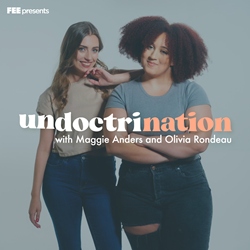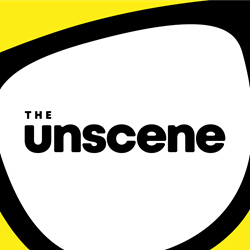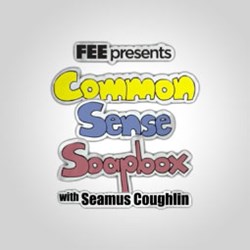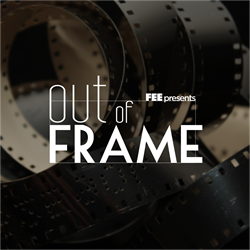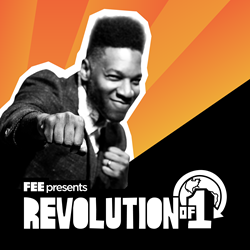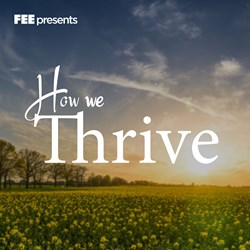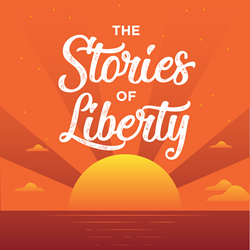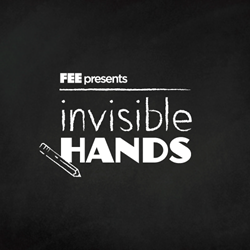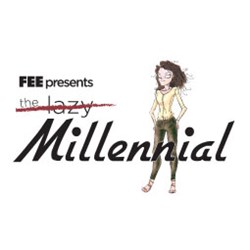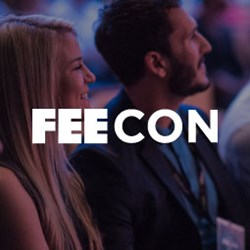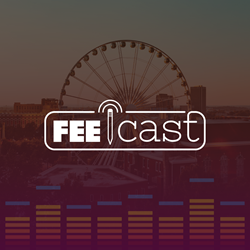INT. STUDIO - DAY
A young, energetic man, KEVIN LIEBER, stands in an open bright space behind an attractive desk, next to FIONA the puppet.
Pedestals and shelves are arranged behind them with a series of PROPS — a giant pencil, busts of important economists, globes and other common indicators of education & economics.
There are more objects relevant to economics on the desk.
We also see a small GREENSCREEN "blackboard" and an attractive ILLUMINATED SIGN with the Foundation for Economic Education logo on it.
SCENE 01: INTRODUCTION
We see a quote on the chalkboard in the background. It reads:
"The curious task of economics is to demonstrate to men how little they really know about what they imagine they can design."
— F.A. Hayek
KEVIN
(to camera)
Hello! Kevin here. Welcome back to "Invisible Hands", the series that makes economics easy and helps you see the beauty of trade and cooperation.
FIONA
With puppets!
KEVIN
Hi Fiona, good to see you. So far in this series, we’ve learned that having good rules and institutions that protect people’s property and freedom are essential for a prosperous and happy society.
(beat)
But now, we're going to look at the ways economic thinking can be used to better understand political decision-making.
FIONA
Oh boy. I guess that means we're going to talk about Politics?
(sarcastically)
Sooo Exciting!
KEVIN
I know, I know. But we're not actually going to talk about "politics" or specific policies--thank goodness! Instead, we're going to talk about how understanding economics helps you understand political behavior.
FIONA
(skeptical)
Go on...
SCENE 02: WHAT ECONOMICS HAS TO DO WITH POLITICS
KEVIN
(to camera)
Ok. Economics is the study of human behavior involving choice, right?
FIONA
Yeah.
KEVIN
Well, politics and law are two ways that people try to influence or control the choices people are allowed make.
FIONA shakes her head.
FIONA
Pff. Politicians, am I right?
The PROFESSOR saunters into frame, raising his hand to add to the conversation.
PROFESSOR
(professor-splaining)
You know... Economics is also really useful if we want to know how those laws really affect human behavior.
KEVIN
That's true.
PROFESSOR
Politics and law are usually intended to create rules for shaping how people should behave, but economic insight can tell us how people might really behave when faced with certain conditions.
FIONA
Rules such as legislation and customs establish the fundamental incentive structure for any economic system. Different rules and institutions created by new legislation or even changing social customs create different incentives.
KEVIN
We already talked about the market process. Now let’s take a look at government intervention in markets and the economy.
(to Professor)
Professor?
SCENE 03: GOVERNMENT INTERVENTION
The quote on the chalkboard shifts again, now it reads:
“This is not a dispute about whether planning is to be done or not. It is a dispute as to whether planning is to be done centrally, by one authority for the whole economic system, or is to be divided among many individuals.”
– F. A. Hayek
PROFESSOR
Ah yes. Well, you see, government intervenes in the market to influence economic outcomes frequently. For instance, we have taxes designed to encourage some behaviors like driving electric cars, and to discourage others such as smoking. The government subsidizes some economic activities or forces people to buy some goods & services while regulating or prohibiting others entirely.
FIONA
I thought that was a bad thing.
PROFESSOR
It usually is.
Fiona shakes her head in disagreement.
FIONA
But what if people make bad choices, and what happens when corporations do bad things? What about people who think that the government needs to plan the economy so it works for everyone? Wouldn’t there be chaos without a plan?
KEVIN
The question we are concerned about is not, “Should there should be economic planning?” All humans plan.
(beat)
The real question is, “Who should do the planning?”
FIONA
(guessing)
Politicians? Right?
(pondering)
Is there an alternative? Robots?
KEVIN
(Robots Joke)
Of course there’s an alternative! Economic activity could follow the centralized plans of a few people with power. But economic order can also emerge from the plans of many, decentralized individuals operating in the free market.
PROFESSOR
Economics might not give us all of the answers, but it can help us ask better questions.
SCENE 04: THE KNOWLEDGE PROBLEM
FIONA
Ok. I’ve got a question! Earlier, you also said that economic thinking helps explain how people make political decisions. What did you mean by that?
New TEXT appears on the chalkboard:
"Where there is no free market, there is no pricing mechanism; without a pricing mechanism, there is no economic calculation."
– Ludwig Von Mises
KEVIN
Ok. The first thing you should consider is that in order to make good decisions, government officials need a lot of specific knowledge about all kinds of stuff related to those decisions.
(beat)
They need to know what resources are available, how scarce they are, what people value, where those resources are most needed, when... And on and on.
PROFESSOR
But all that knowledge is dispersed in tiny, localized bits throughout an economy. This knowledge is always and constantly changing in response to new circumstances.
FIONA
That's like how we talked about subjective value -- how I know when I'm hungry and what I want to eat, but how that changes all the time and nobody else is ever going to know what I'm looking for at the moment I'm looking.
KEVIN
Bingo! Everyone has their own unique, subjective valuations of resources in a world that is constantly changing.
PROFESSOR
By its very nature, it's actually impossible that this situational knowledge can ever be collected, aggregated, and used by a central authority to effectively plan and engineer society.
SCENE 05: I, PENCIL
An IMAGE of a PENCIL appears on the blackboard. It is ANIMATED to break apart into its constituent parts.
KEVIN
The Foundation for Economic Education's founder, Leonard Read, wrote an essay about this called "I, Pencil". In it, he explains that no person or group can possibly have sufficient knowledge to make something as seemingly simple a pencil, much less plan the actions of millions of people.
FIONA
So, that's why a lot of legislation intended to help poor people or improve education doesn't work?
KEVIN
Unfortunately, yeah. Even when central planners have the best of intentions, it's still impossible for them to have anywhere close to the knowledge necessary to run an entire economy.
FIONA
So what are we supposed to do instead?
KEVIN
We rely on markets and prices to communicate all this knowledge and coordinate production and consumption across time and space.
FIONA
Well that sounds like science fiction.
PROFESSOR
But it isn't! Prices communicate the local knowledge of individuals in the market and provide incentives for people to act on that information and coordinate with one another. Prices are incentives wrapped in knowledge that help people coordinate in an economy.
SCENE 06: PUBLIC CHOICE
TEXT appears on the blackboard. It reads:
“Common sense tells you that a politician is very much like the rest of us.”
– James M. Buchanan
FIONA
Are you saying there's no room for any decisions to be made through political action?
KEVIN
Well.. No. Markets are great, but they're not going to solve every problem and they're not going to produce perfect outcomes.
FIONA
And that's where government comes in?
KEVIN
Eh... . Maybe.
(beat)
A lot of people assume that that's the only choice. But you also have to understand that a lot of the time, government solutions aren't always better.
PROFESSOR
Just as advocates of markets–
FIONA
(interjecting)
Like you.
PROFESSOR
–Yes, like me.
(beat)
Just as we shouldn't believe that markets will create utopia on earth, advocates of government alternatives shouldn't be naïve about what can be accomplished through policy in the real world. But all too often, advocates for government solutions compare an imperfect market reality to an imaginary government ideal.
The words "Politics Without Romance" appear on the blackboard.
FIONA
You mean we have to think about how public policy works in the real world.
PROFESSOR
Well yes, but most people don’t do that.
KEVIN
We usually end up talking about what we wish government policies would do instead of what they actually will do.
SCENE 07: INTENTIONS VS. RESULTS
FIONA
So... You’re saying that just because a politician has good intentions doesn’t mean that their policies are actually helpful.
KEVIN
Yeah, or even that they're not actively harmful. We should always compare the imperfect reality of markets to the imperfect reality of government.
PROFESSOR
Right! And... We have to do that before we rush to support restrictions and interventions into the economy. There are some ideas from economics we should always consider in order to see this stuff clearly.
FIONA
Like what?
KEVIN
Well, for one thing, that people are self-interested.
(beat)
All people.
PROFESSOR
Including government officials.
FIONA
Yeah, I see what you mean. We usually think of government employees as selfless public servants, working for the common good. But that's kinda unrealistic. We're all just people, right?
PROFESSOR
Yes, we are. And remember, incentives affect the way people behave, and the incentives in politics can be truly outrageous.
SCENE 08: POLITICAL INCENTIVES
A new quote appears on the blackboard. TEXT reads:
"Democracy is the art and science of running the circus from the monkey cage."
– H.L. Mencken
KEVIN
Politicians can easily become more concerned with winning elections and maintaining or increasing their power than promoting policies in the best interest of their constituents. Plus, whenever government power exists to control economic outcomes, special interest groups have strong incentives to influence politicians for their own benefit.
FIONA
Like corporate lobbyists.
KEVIN
Sure, but not just corporations. Unions and non-profit organizations, too. Even government agencies themselves lobby to influence politics.
FIONA
Isn't that a conflict of interest?
Kevin shrugs wryly, as new TEXT appears on the blackboard. It reads:
“The more politicized an economy becomes, the more private actors try to rig regulations and the law to cheat consumers and competitors.”
– Jason Brennan
PROFESSOR
(chiming in)
Seeking special favors through government is what economists call rent-seeking and what the rest of us might call cronyism. Rent-seekers manipulate the political process in an attempt to grab the wealth generated by others. And, the more politics are used to regulate an economy, the more people try to use politics to gain economic advantage over others.
SCENE 09: THE SEEN AND UNSEEN
Another quote appears as TEXT on the blackboard.
“The art of economics consists in looking not merely at the immediate but at the longer effects of any act or policy; it consists in tracing the consequences of that policy not merely for one group but for all groups.”
– Henry Hazlitt
KEVIN
You know, it's really not surprising why this would happen.
FIONA
I suppose not. If government policies create concentrated benefits for special interest groups, it makes sense that they'd want to try to manipulate politics to get in on the action. But why doesn't anyone try to stop it?
PROFESSOR
Nobody has any meaningful incentive to stop it!
KEVIN
That's right. The benefits are concentrated, sure. But the costs are extremely dispersed. So while some giant company might get millions of dollars in subsidies to build a new factory, the cost to any individual taxpayer could be a few pennies a year.
FIONA
So... The people affected don't have good enough reason to fight the new policies.
KEVIN
If they even know they're being affected at all... It's also an issue of what's "Seen" and "Unseen". Too often, people only focus on the highly-visible, narrow, and/or short-term effects of economic policy – the stuff they can easily see.
FIONA
I guess when a company gets subsidized, it's easier for people to see new jobs than it is to see what the subsidies really cost... And what didn’t happen because their money was given away.
KEVIN
Way easier. But the art of economic thinking is learning to seriously consider the short-term and specific consequences and the long-term and widespread consequences of a policy. Thinking more carefully about, not just the seen, but about the unseen can help us make better decisions.
(beat)
In politics... And in life.
PROFESSOR
And by the way, this is the central point of Henry Hazlitt’s classic work, Economics in One Lesson!
We see an IMAGE of the book on the blackboard.
SCENE 10: WRAP-UP
FIONA
I guess we should stop getting so romantic about politics, huh?
KEVIN
Yeah. Let's keep the romance to moonlit walks on the beach. We should be more realistic with politics.
(to camera)
And that’s where we’re going to have to leave this complex and difficult topic. If you have any questions or want to dig deeper into these ideas, leave a comment on this video and check out the Foundation for Economic Education’s “Economics in One Day” course at courses.fee.org. See you next time!
About this show
Popular YouTube host Kevin Lieber (VSauce2) hosts this informative and entertaining video series designed to introduce key concepts of economics to younger audiences through credible arguments, comedy... And puppets!
